- Home
- Kahlil Gibran
Collected Poetical Works of Kahlil Gibran Page 4
Collected Poetical Works of Kahlil Gibran Read online
Page 4
“This must be a shrine,” he said to himself, and he too went in. But what was his surprise to find himself in a hall of great splendour and a large company of men and women seated about many tables. They were eating and drinking and listening to the musicians.
“Nay,” said the dreamer. “This is no worshipping. It must be a feast given by the prince to the people, in celebration of a great event.”
At that moment a man, whom he took to be the slave of the prince, approached him, and bade him be seated. And he was served with meat and wine and most excellent sweets.
When he was satisfied, the dreamer rose to depart. At the door he was stopped by a large man magnificently arrayed.
“Surely this is the prince himself,” said the dreamer in his heart, and he bowed to him and thanked him.
Then the large man said in the language of the city:
“Sir, you have not paid for your dinner.” And the dreamer did not understand, and again thanked him heartily. Then the large man bethought him, and he looked more closely upon the dreamer. And he saw that he was a stranger, clad in but a poor garment, and that indeed he had not wherewith to pay for his meal. Then the large man clapped his hands and called — and there came four watchmen of the city. And they listened to the large man. Then they took the dreamer between them, and they were two on each side of him. And the dreamer noted the ceremoniousness of their dress and of their manner and he looked upon them with delight.
“These,” said he, “are men of distinction.”
And they walked all together until they came to the House of Judgment and they entered.
The dreamer saw before him, seated upon a throne, a venerable man with flowing beard, robed majestically. And he thought he was the king. And he rejoiced to be brought before him.
Now the watchmen related to the judge, who was the venerable man, the charge against the dreamer; and the judge appointed two advocates, one to present the charge and the other to defend the stranger. And the advocates rose, the one after the other, and delivered each his argument. And the dreamer thought himself to be listening to addresses of welcome, and his heart filled with gratitude to the king and the prince for all that was done for him.
Then sentence was passed upon the dreamer, that upon a tablet hung about his neck his crime should be written, and that he should ride through the city on a naked horse, with a trumpeter and a drummer before him. And the sentence was carried out forthwith.
Now as the dreamer rode through the city upon the naked horse, with the trumpeter and the drummer before him, the inhabitants of the city came running forth at the sound of the noise, and when they saw him they laughed one and all, and the children ran after him in companies from street to street. And the dreamer’s heart was filled with ecstasy, and his eyes shone upon them. For to him the tablet was a sign of the king’s blessing and the procession was in his honour.
Now as he rode, he saw among the crowd a man who was from the desert like himself and his heart swelled with joy, and he cried out to him with a shout:
“Friend! Friend! Where are we? What city of the heart’s desire is this? What race of lavish hosts? — who feast the chance guest in their palaces, whose princes companion him, whose king hangs a token upon his breast and opens to him the hospitality of a city descended from heaven.”
And he who was also of the desert replied not. He only smiled and slightly shook his head. And the procession passed on.
And the dreamer’s face was uplifted and his eyes were overflowing with light.
LOVE
They say the jackal and the mole
Drink from the self-same stream
Where the lion comes to drink.
And they say the eagle and the vulture
Dig their beaks into the same carcass,
And are at peace, one with the other,
In the presence of the dead thing.
O love, whose lordly hand
Has bridled my desires,
And raised my hunger and my thirst
To dignity and pride,
Let not the strong in me and the constant
Eat the bread or drink the wine
That tempt my weaker self.
Let me rather starve,
And let my heart parch with thirst,
And let me die and perish,
Ere I stretch my hand
To a cup you did not fill,
Or a bowl you did not bless.
THE KING-HERMIT
THEY told me that in a forest among the mountains lives a young man in solitude who once was a king of a vast country beyond the Two Rivers. And they also said that he, of his own will, had left his throne and the land of his glory and come to dwell in the wilderness.
And I said, “I would seek that man, and learn the secret of his heart; for he who renounces a kingdom must needs be greater than a kingdom.”
On that very day I went to the forest where he dwells. And I found him sitting under a white cypress, and in his hand a reed as if it were a sceptre. And I greeted him even as I would greet a king.
And he turned to me and said gently, “What would you in this forest of serenity? Seek you a lost self in the green shadows, or is it a home-coming in your twilight?”
And I answered, “I sought but you — for I fain would know that which made you leave a kingdom for a forest.”
And he said, “Brief is my story, for sudden was the bursting of the bubble. It happened thus: One day as I sat at a window in my palace, my chamberlain and an envoy from a foreign land were walking in my garden. And as they approached my window, the lord chamberlain was speaking of himself and saying, ‘I am like the king; I have a thirst for strong wine and a hunger for all games of chance. And like my lord the king I have storms of temper.’ And the lord chamberlain and the envoy disappeared among the trees. But in a few minutes they returned, and this time the lord chamberlain was speaking of me, and he was saying, ‘My lord the king is like myself — a good marksman; and like me he loves music and bathes thrice a day.’”
After a moment he added, “On the eve of that day I left my palace with but my garment, for I would no longer be ruler over those who assume my vices and attribute to me their virtues.”
And I said, “This is indeed a wonder, and passing strange.”
And he said, “Nay, my friend, you knocked at the gate of my silences and received but a trifle. For who would not leave a kingdom for a forest where the seasons sing and dance ceaselessly? Many are those who have given their kingdom for less than solitude and the sweet fellowship of aloneness. Countless are the eagles who descend from the upper air to live with moles that they may know the secrets of the earth. There are those who renounce the kingdom of dreams that they may not seem distant from the dreamless. And those who renounce the kingdom of nakedness and cover their souls that others may not be ashamed in beholding truth uncovered and beauty unveiled. And greater yet than all of these is he who renounces the kingdom of sorrow that he may not seem proud and vainglorious.”
Then rising he leaned upon his reed and said, “Go now to the great city and sit at its gate and watch all those who enter into it and those who go out. And see that you find him who, though born a king, is without kingdom; and him who though ruled in flesh rules in spirit — though neither he nor his subjects know this; and him also who but seems to rule yet is in truth slave of his own slaves.”
After he had said these things he smiled on me, and there were a thousand dawns upon his lips. Then he turned and walked away into the heart of the forest.
And I returned to the city, and I sat at its gate to watch the passersby even as he had told me. And from that day to this numberless are the kings whose shadows have passed over me and few are the subjects over whom my shadow has passed.
THE LION’S DAUGHTER
FOUR slaves stood fanning an old queen who was asleep upon her throne. And she was snoring. And upon the queen’s lap a cat lay purring and gazing lazily at the slaves.
The first
slave spoke, and said, “How ugly this old woman is in her sleep. See her mouth droop; and she breathes as if the devil were choking her.”
Then the cat said, purring, “Not half so ugly in her sleep as you in your waking slavery.”
And the second slave said, “You would think sleep would smooth her wrinkles instead of deepening them. She must be dreaming of something evil.”
And the cat purred, “Would that you
might sleep also and dream of your freedom.”
And the third slave said, “Perhaps she is seeing the procession of all those that she has slain.”
And the cat purred, “Aye, she sees the procession of your forefathers and your descendants.”
And the fourth slave said, “It is all very well to talk about her, but it does not make me less weary of standing and fanning.”
And the cat purred, “You shall be fanning to all eternity; for as it is on earth so it is in heaven.”
At this moment the old queen nodded in her sleep, and her crown fell to the floor.
And one of the slaves said, “That is a bad omen.”
And the cat purred, “The bad omen of one is the good omen of another.”
And the second slave said, “What if she should wake, and find her crown fallen! She would surely slay us.”
And the cat purred, “Daily from your birth she has slain you and you know it not.”
And the third slave said, “Yes, she would slay us and she would call it making sacrifice to the gods.”
And the cat purred, “Only the weak are sacrificed to the gods.”
And the fourth slave silenced the others, and softly he picked up the crown and replaced it, without waking her, on the old queen’s head.
And the cat purred, “Only a slave restores a crown that has fallen.”
And after a while the old queen woke, and she looked about her and yawned. Then she said, “Methought I dreamed, and I saw four caterpillars chased by a scorpion around the trunk of an ancient oaktree. I like not my dream.”
Then she closed her eyes and went to sleep again. And she snored. And the four slaves went on fanning her.
And the cat purred, “Fan on, fan on, stupids. You fan but the fire that consumes you.”
TYRANNY
THUS sings the She-Dragon that guards the seven caves by the sea:
“My mate shall come riding on the waves. His thundering roar shall fill the earth with fear, and the flames of his nostrils shall set the sky afire. At the eclipse of the moon we shall be wedded, and at the eclipse of the sun I shall give birth to a Saint George, who shall slay me.”
Thus sings the She-Dragon that guards the seven caves by the sea.
THE SAINT
IN my youth I once visited a saint in his silent grove beyond the hills; and as we were conversing upon the nature of virtue a brigand came limping wearily up the ridge. When he reached the grove he knelt down before the saint and said, “O saint, I would be comforted! My sins are heavy upon me.”
And the saint replied, “My sins, too, are heavy upon me.”
And the brigand said, “But I am a thief and a plunderer.”
And the saint replied, “I too am a thief and a plunderer.”
And the brigand said, “But I am a murderer, and the blood of many men cries in my ears.”
And the saint replied, “I too am a murderer, and in my ears cries the blood of many men.”
And the brigand said, “I have committed countless crimes.”
And the saint replied, “I too have committed crimes without number.”
Then the brigand stood up and gazed at the saint, and there was a strange look in his eyes. And when he left us he went skipping down the hill.
And I turned to the saint and said, “Wherefore did you accuse yourself of uncommitted crimes? See you not that this man went away no longer believing in you?”
And the saint answered, “It is true he no longer believes in me. But he went away much comforted.”
At that moment we heard the brigand singing in the distance, and the echo of his song filled the valley with gladness.
THE PLUTOCRAT
IN my wanderings I once saw upon an island a man-headed, iron-hoofed monster who ate of the earth and drank of the sea incessantly. And for a long while I watched him. Then I approached him and said, “Have you never enough; is your hunger never satisfied and your thirst never quenched?”
And he answered saying, “Yes, I am satisfied, nay, I am weary of eating and drinking; but I am afraid that tomorrow there will be no more earth to eat and no more sea to drink.”
THE GREATER SELF
THIS came to pass. After the coronation of Nufsibaäl, King of Byblus, he retired to his bed chamber — the very room which the three hermit-magicians of the mountain had built for him. He took off his crown and his royal raiment, and stood in the centre of the room thinking of himself, now the all-powerful ruler of Byblus.
Suddenly he turned; and he saw stepping out of the silver mirror which his mother had given him, a naked man.
The king was startled, and he cried out to the man, “What would you?”
And the naked man answered, “Naught but this: Why have they crowned you king?”
And the king answered, “Because I am the noblest man in the land.”
Then the naked man said, “If you were still more noble, you would not be king.”
And the king said, “Because I am the mightiest man in the land they crowned me.”
And the naked man said, “If you were mightier yet, you would not be king.”
Then the king said, “Because I am the wisest man they crowned me king.”
And the naked man said, “If you were still wiser you would not choose to be king.”
Then the king fell to the floor and wept bitterly.
The naked man looked down upon him. Then he took up the crown and with tenderness replaced it upon the king’s bent head.
And the naked man, gazing lovingly upon the king, entered into the mirror.
And the king roused, and straightway he looked into the mirror. And he saw there but himself crowned.
WAR AND THE SMALL NATIONS
ONCE, high above a pasture, where a sheep and a lamb were grazing, an eagle was circling and gazing hungrily down upon the lamb. And as he was about to descend and seize his prey, another eagle appeared and hovered above the sheep and her young with the same hungry intent. Then the two rivals began to fight filling the sky with their fierce cries.
The sheep looked up and was much astonished. She turned to the lamb and said,
“How strange, my child, that these two noble birds should attack one another. Is not the vast sky large enough for both of them? Pray, my little one, pray in your heart that God may make peace between your winged brothers.”
And the lamb prayed in his heart.
CRITICS
ONE nightfall a man travelling on horseback toward the sea reached an inn by the roadside. He dismounted, and confident in man and night like all riders toward the sea, he tied his horse to a tree beside the door and entered into the inn.
At midnight, when all were asleep, a thief came and stole the traveller’s horse.
In the morning the man awoke, and discovered that his horse was stolen. And he grieved for his horse, and that a man had found it in his heart to steal.
Then his fellow-lodgers came and stood around him and began to talk.
And the first man said, “How foolish of you to tie your horse outside the stable.”
And the second said, “Still more foolish, without even hobbling the horse!”
And the third man said, “It is stupid at best to travel to the sea on horseback.”
And the fourth said, “Only the indolent and the slow of foot own horses.”
Then the traveller was much astonished. At last he cried, “My friends, because my horse is stolen, you have hastened one and all to tell me my faults and my shortcomings. But strange, not one word of reproach have you uttered abo
ut the man who stole my horse.”
POETS
FOUR poets were sitting around a bowl of punch that stood on a table.
Said the first poet, “Methinks I see with my third eye the fragrance of this wine hovering in space like a cloud of birds in an enchanted forest.”
The second poet raised his head and said, “With my inner ear I can hear those mist-birds singing. And the melody holds my heart as the white rose imprisons the bee within her petals.”
The third poet closed his eyes and stretched his arm upward, and said, “I touch them with my hand. I feel their wings, like the breath of a sleeping fairy, brushing against my fingers.”
Then the fourth poet rose and lifted up the bowl, and he said, “Alas, friends! I am too dull of sight and of hearing and of touch. I cannot see the fragrance of this wine, nor hear its song, nor feel the beating of its wings. I perceive but the wine itself. Now therefore must I drink it, that it may sharpen my senses and raise me to your blissful heights.”
And putting the bowl to his lips, he drank the punch to the very last drop.
The three poets, with their mouths open, looked at him aghast, and there was a thirsty yet unlyrical hatred in their eyes.
THE WEATHER-COCK
SAID the weather-cock to the wind, “How tedious and monotonous you are! Can you not blow any other way but in my face? You disturb my God-given stability.”
And the wind did not answer. It only laughed in space.
THE KING OF ARADUS
ONCE the elders of the city of Aradus presented themselves before the king, and besought of him a decree to forbid to men all wine and all intoxicants within their city.
And the king turned his back upon them and went out from them laughing.
Then the elders departed in dismay.
At the door of the palace they met the lord chamberlain. And the lord chamberlain observed that they were troubled, and he understood their case.

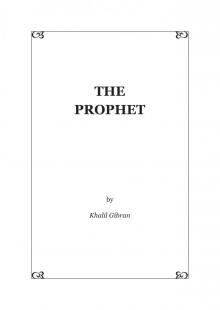 The Prophet
The Prophet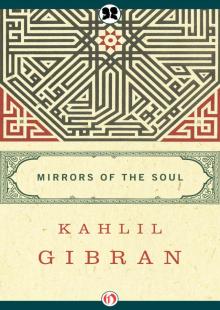 Mirrors of the Soul
Mirrors of the Soul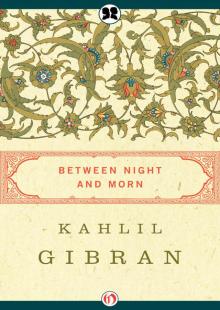 Between Night and Morn
Between Night and Morn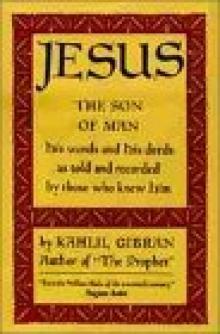 Jesus the Son of Man
Jesus the Son of Man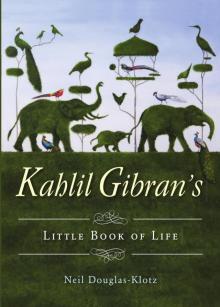 The Little Book of Life's Wisdom
The Little Book of Life's Wisdom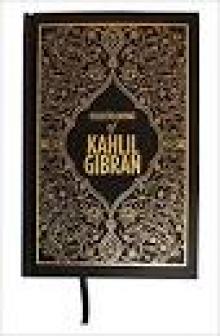 The Kahlil Gibran Collection
The Kahlil Gibran Collection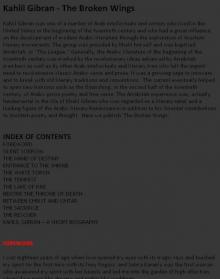 The Broken Wings
The Broken Wings Collected Poetical Works of Kahlil Gibran
Collected Poetical Works of Kahlil Gibran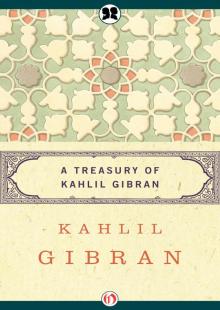 The Treasured Writings of Kahlil Gibran
The Treasured Writings of Kahlil Gibran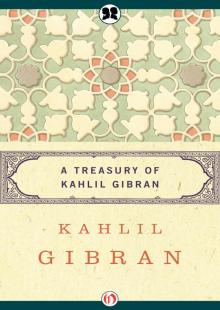 Treasury of Kahlil Gibran
Treasury of Kahlil Gibran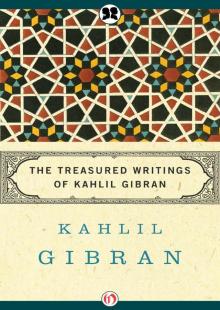 Treasured Writings of Kahlil Gibran
Treasured Writings of Kahlil Gibran